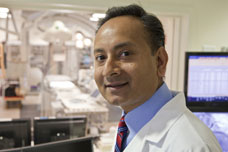
|
|
A helping hand for hearts

Cardiac-assist devices can take over pumping action for weakened hearts
Miniature heart pumps the size of a pencil eraser are saving the lives of patients who otherwise may not survive complex heart procedures.
Moreover, they can be implanted without open surgery, which is a major benefit for severely ill patients, says Dr. Panav Patel, director of the cardiac catheterization lab at UC Irvine Douglas Hospital.
"Once the device is activated, it takes over some or all of the heart's pumping action," Patel says. "This helps keep blood moving through the circulatory system when a patient's own heart is temporarily too weak or damaged to do this on its own."
The new cardiac assist devices are lifesavers for critically ill heart-attack patients and people who have heart failure. They're also a godsend for people with cardiogenic shock, a condition in which a weakened heart is suddenly unable to pump enough blood to meet the body's needs.
Likewise, the tiny devices are saving the lives of people whose hearts are too weak or damaged to tolerate a desperately needed cardiac procedure such as coronary artery angioplasty and stenting. "By taking over some of the heart's work, new cardiac-assist devices such as the TandemHeart® and Impella® are providing support for many people who previously would have been considered inoperable," says Patel.
The relative ease with which the devices can be implanted and removed is an important factor for patients with a severely weakened heart. Unlike the larger and more cumbersome LVADs that require a full-scale operation for implantation, including opening the rib cage, the new devices can be put in place in a few minutes by an interventional cardiologist.
The Impella device is so small it can be inserted into the femoral artery in the leg using a thin tube called a catheter, which is guided into the left ventricle (bottom chamber of the heart). The larger TandemHeart requires a small incision in the femoral vein, through which the catheter is introduced and guided into the left atrium (top chamber of the heart). Blood is then directed out to a small pump, which is strapped to the patient’s thigh. From here, the blood is circulated back into the body through the femoral artery.
The new cardiac assist devices can pump between 2.5 and 5.0 liters of blood per minute, acting as a lifesaving bridge to recovery or further treatment. "A healthy heart pumps five liters of blood per minute when the body is at rest. If the cardiac assist device pumps three liters, the patient’s heart only has to pump two," says Patel. "That's a tremendous help for a patient who's struggling with the effects of a seriously damaged heart."
He recalls a patient who suffered a heart attack after having had previous cardiac bypass surgery several years earlier. "His current heart attack was caused by blockages in the same two major arteries that were blocked before," says Patel. "However, he wasn’t a candidate for another coronary bypass procedure because his heart was too weak, putting him at high risk for surgery."
For these reasons, Patel and the cardiology team decided that angioplasty and stenting was the treatment of choice. But there was concern that the patient couldn’t survive even this minimally invasive procedure because his heart was laboring under the immediate strain of his recent heart attack.
"The Impella was implanted to give the patient's heart a bit of a rest during angioplasty and stenting," says Patel. "We eliminated the blockages using a balloon-tipped catheter and kept the arteries open with stents, which are miniature wire props. The procedure was successful and the Impella was removed immediately after angioplasty. The patient went home two days later."
For referral to a UC Irvine Healthcare cardiologist, call 877.UCI.DOCS.